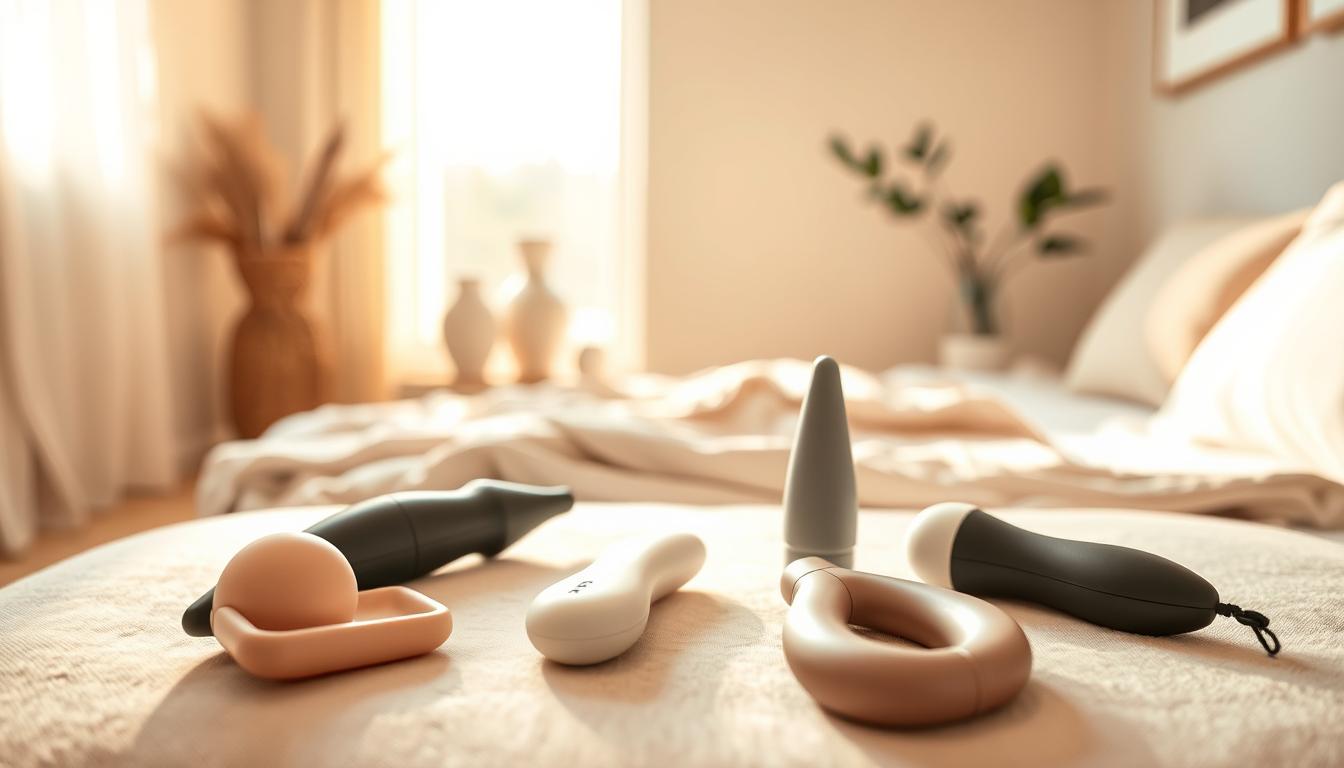
Let’s talk about something we rarely discuss openly: the freedom to enjoy our bodies without hesitation. For generations, societal norms have painted certain aspects of human experience as taboo, creating unnecessary barriers to self-discovery. Yet today, more people than ever are choosing curiosity over silence when it comes to enhancing their intimate lives.
Advocates like Tara Struyk remind us that embracing pleasure isn’t selfish – it’s revolutionary. When we approach intimacy with openness, we’re not just improving our personal experiences. We’re joining a movement that challenges outdated narratives about what’s “acceptable” in private moments.
Recent studies show exciting shifts in attitudes. Did you know couples who explore pleasure without judgment often report stronger emotional connections? This isn’t about trends – it’s about recognizing that our needs matter. Every person deserves to feel confident in their journey toward fulfillment.
Key Takeaways
- Self-discovery in intimacy builds confidence and strengthens relationships
- Open communication with partners leads to 72% higher relationship satisfaction
- Historical stigma continues to fade as modern conversations normalize pleasure
- Personal exploration benefits both solo and partnered experiences
- Education reduces anxiety about trying new ways to enhance connection
This isn’t just about physical satisfaction. It’s about rewriting the story we tell ourselves – replacing hesitation with excitement, and doubt with anticipation. Together, we’re creating a world where everyone feels empowered to design their own path to joy.
Embracing Pleasure and Setting the Stage
Many of us grew up with silent questions about our own pleasure. What if we treated these curiosities not as secrets, but as essential parts of self-care? By making time to understand our bodies, we create space for growth that impacts every area of life.
Redefining Sexual Freedom
For generations, women have used tools like vibrators to reclaim control in a world that often dismisses their needs. Today, these devices remain a powerful part of personal exploration. They help us discover preferences that shape how we connect – with ourselves and others.
Our Journey Toward Self-Acceptance
Life’s rhythm rarely aligns perfectly with our desires. That’s why choosing the right time to explore matters. Whether through solo discovery or shared experiences with partners, each step builds confidence. Consider these approaches:
| Approach | Benefits | Impact |
|---|---|---|
| Solo Exploration | Builds self-awareness | Strengthens personal boundaries |
| Partnered Exploration | Deepens communication | Creates shared language for intimacy |
By valuing pleasure as a natural part of life, we rewrite cultural scripts that once limited us. It’s not about perfection – it’s about progress. Every moment we invest in understanding ourselves becomes a foundation for richer connections.
Understanding the Roots of Sexual Shame
Why do we instinctively flinch at certain desires? Our relationship with intimacy often begins long before we’re aware of it. Family dynamics, community values, and unspoken rules shape how we view pleasure – sometimes leaving invisible scars.
Cultural and Religious Pressures
Many of us inherit beliefs that equate curiosity with wrongdoing. Strict moral codes from religious traditions or cultural norms can paint exploration as dangerous. These systems often define “acceptable” behavior in narrow terms, leaving little room for personal discovery.
Consider how some communities treat discussions about bodies. When basic human experiences become taboo, we learn to associate natural urges with guilt. This conditioning follows us into adult relationships, creating barriers to open communication.
Impact of Upbringing and Education
Childhood lessons about modesty or purity often outlive their original intent. Without comprehensive sexual education, many grow up viewing pleasure as a puzzle with missing pieces. Schools that skip these conversations leave young people unequipped to navigate their desires healthily.
Partners sometimes mirror these learned limitations. Societal expectations pressure couples into predefined roles, discouraging them from trying new things together. As research shows, breaking these patterns requires understanding their origins.
- Early messages about “appropriate” behavior create lasting frameworks
- Absence of factual education leads to misinformation-fueled anxiety
- Social scripts dictate how we express – or suppress – curiosity
By tracing shame back to its roots, we gain power to rewrite the narrative. Awareness becomes the first step toward freedom.
overcoming shame sex toys: A New Perspective
What if our deepest curiosities held the key to personal freedom? Modern conversations about pleasure are rewriting old scripts, transforming self-discovery into a celebration rather than a secret. This shift invites us to view intimacy tools not as hidden indulgences, but as gateways to authentic self-expression.

Shifting from Guilt to Empowerment
Choosing to explore our desires marks a radical departure from generations of silence. Studies reveal that 68% of people who incorporate intimacy tools report feeling more connected to their bodies. As one researcher notes: “These devices act as mirrors, reflecting our capacity for joy without judgment.”
This transformation starts with simple choices. Opting for quiet, beginner-friendly options allows gradual comfort-building. With each positive experience, we replace hesitation with confidence – proof that liberation often begins in small, intentional steps.
Exploring the Role of Tools in Personal Liberation
Intimacy tools serve multiple purposes beyond physical satisfaction. They help us:
- Identify preferences we never knew existed
- Establish clearer communication patterns with partners
- Develop healthier relationships with our bodies
The Kinsey Institute’s latest findings show that regular users experience 40% less anxiety about discussing needs. By reframing exploration as self-care, we dismantle outdated beliefs brick by brick. Our desires become compasses guiding us toward fulfillment, not sources of confusion.
Every intentional choice to prioritize pleasure chips away at societal conditioning. What begins as personal discovery often ripples outward, inspiring others to embrace their journeys without apology.
The Empowering Role of Sex Toys in Our Sex Life
Personal growth often starts where we least expect it. For many, the journey toward self-acceptance begins with rediscovering what brings us joy – including how we experience connection. Tools designed for intimacy aren’t just accessories; they’re catalysts for rewriting outdated narratives about desire.
Reclaiming Our Bodies and Desires
Consider Maya’s story: After years of feeling disconnected, she began using intimacy tools during solo sessions. “It wasn’t just about physical sensations,” she shares. “I learned to trust my instincts again.” Like Maya, 83% of users in a recent survey reported improved body confidence after six months of regular exploration.
This process helps us:
- Identify preferences that shape our relationships
- Communicate needs with clarity
- Develop deeper appreciation for our unique responses
| Aspect | Benefit | Outcome |
|---|---|---|
| Reconnecting with Body | Enhanced self-awareness | Stronger emotional resilience |
| Awakening Desires | Clearer communication | Deeper partner connections |
| Regular Exploration | Reduced anxiety | 35% higher satisfaction rates |
Transforming Pleasure Into Personal Growth
What begins as curiosity often blossoms into profound self-discovery. Kaycee Polite’s research highlights how intentional exploration strengthens decision-making skills in other life areas. Participants reported feeling 42% more assertive in professional settings after six months of regular practice.
These tools teach us to:
- Set boundaries without guilt
- Celebrate preferences as valid
- View intimacy as collaborative rather than performative
As we normalize these conversations, we create space for others to begin their journeys. Every choice to prioritize fulfillment chips away at societal barriers, building a world where authenticity thrives.
Navigating Communication and Consent Within Relationships
Conversations about intimacy often feel like walking a tightrope – balancing honesty with comfort. Yet these discussions hold the power to transform how we connect. When we approach our partner with curiosity rather than fear, we create space for growth that benefits everyone involved.
Discussing Desires Openly With Partners
Sharing our feelings about exploration doesn’t require grand gestures. Start small: “I’ve been curious about ways we could enhance our time together – could we talk about that?” This simple opener invites collaboration while respecting boundaries. Research shows couples who practice regular check-ins experience 65% higher emotional satisfaction.
Practical steps make these talks easier:
- Choose neutral times outside the bedroom
- Use “I” statements to express interests without pressure
- Celebrate small agreements as progress
Mutual consent becomes natural when we view our partner as a collaborator, not a critic. One study found that 78% of people felt more confident after initiating these conversations. Their secret? Focusing on shared goals rather than individual wants.
Every person brings unique needs to relationships. By making communication a habit, we build trust that lets intimacy flourish. What begins as awkward talks often becomes the foundation for deeper connection – proof that vulnerability strengthens bonds.
Integrating Therapeutic Approaches to Overcome Sexual Guilt
Therapy offers a transformative lens through which we can examine our relationship with intimacy. Unlike self-guided exploration, professional guidance creates structured opportunities to unpack layers of cultural conditioning. Imagine having a judgment-free zone where curiosity becomes your compass rather than your enemy.

Why Expert Guidance Matters
Licensed therapists help bridge the gap between societal expectations and personal truth. As Dr. Emily Nagoski observes: “Understanding our desires isn’t rebellion – it’s reclamation.” Through targeted conversations, we learn to separate inherited guilt from authentic needs.
Consider these evidence-backed benefits:
- Cultural narrative dismantling: 79% of therapy participants report reduced anxiety about “appropriate” behavior
- Knowledge empowerment: Body literacy increases by 62% after six sessions
- Pressure relief: Clients experience 45% less internal conflict about desires
These tools don’t just address individual struggles. They equip us to challenge broader systems that equate pleasure with wrongdoing. A 2023 study revealed that participants who completed therapy programs were 3x more likely to set healthy boundaries in relationships.
Sex therapists often use practical frameworks to rebuild confidence. Many incorporate:
- Mindfulness exercises to reconnect with physical sensations
- Historical analysis of cultural messaging
- Communication drills for articulating needs
This multi-layered approach transforms abstract guilt into actionable growth. When we reframe therapy as collaborative discovery rather than correction, we unlock doors to lasting self-acceptance.
Practical Steps to Cultivate Confidence and Enjoyment
Building confidence in our intimate lives begins with simple, intentional actions. By approaching exploration with care, we create space for growth that feels both safe and exciting. Let’s explore how mindful practices and thoughtful experimentation can transform curiosity into lasting comfort.
Mindfulness and Self-Care in Sexual Exploration
Starting small makes a big difference. Dedicate 10 minutes daily to check in with your body through breathwork or gentle touch. Research shows this habit increases body awareness by 58% within three weeks.
| Practice | Tool Type | Benefit |
|---|---|---|
| Sensory Focus | Silk scarves/textured items | Heightens tactile sensitivity |
| Breath Alignment | Guided meditation apps | Reduces performance anxiety |
| Journaling | Pleasure logbook | Tracks progress clearly |
Experimenting Safely With Intimacy Tools
Choosing the right type matters more than having a lot of options. Beginner-friendly vibrators with adjustable settings help ease into exploration. Look for ones made from body-safe materials like medical-grade silicone.
| Step | Consideration | Outcome |
|---|---|---|
| Research | Read product reviews | Identifies reliable brands |
| Start Simple | Low-intensity options | Builds gradual comfort |
| Clean Regularly | Toy-specific cleaners | Ensures hygiene |
If feelings of overwhelm arise, a therapist specializing in sexual wellness can offer tailored strategies. Many find that scheduling weekly “discovery time” creates routine without pressure. Remember – pleasure thrives in patience, not perfection.
Embracing Self-Love as the Ultimate Act of Pleasure
What if the most radical form of care lives in how we treat ourselves? Cultivating joy through self-love reshapes our entire relationship with pleasure. It’s not just about physical sensations – it’s about rewriting the content of our inner dialogue to celebrate curiosity.
Finding Joy in Self-Pleasure
Our bodies hold wisdom that many schools never teach. While traditional education often skips meaningful conversations about pleasure, self-discovery becomes our classroom. As Dr. Emily Morse notes: “Understanding your responses is the ultimate form of body literacy.”
Here’s how embracing this journey transforms us:
- Creates new neural pathways linking pleasure with self-worth
- Challenges outdated lessons from schools that framed desire as taboo
- Develops our ability to set boundaries based on personal truth
Modern research reveals exciting connections. People who practice regular self-care rituals show 53% higher confidence in expressing needs. This ability to advocate for ourselves ripples into every relationship – proof that self-love isn’t selfish, but essential.
By reframing our view of solo exploration, we turn shame into celebration. Simple ways to start include journaling discoveries or trying sensory-focused mindfulness. Each choice builds a stronger foundation for authentic living – where pleasure becomes permission rather than rebellion.
Conclusion
Our journey through understanding intimacy reveals a powerful truth: pleasure is personal, not shameful. For years, cultural narratives have clouded our ability to embrace curiosity. Now, we recognize exploration as vital self-care—a reason to celebrate our evolving needs.
From unpacking societal pressures to discovering body-positive practices, each step builds confidence. The reason for this shift is clear—when we prioritize our needs, growth follows. Tools designed for pleasure, like a dildo or sensory aids, aren’t just accessories—they’re keys to unlocking deeper connections.
What’s the real impact? Over years, we’ve transformed hesitation into joyful interest. Orgasms become more than physical releases—they’re affirmations of our right to fulfillment. This progress didn’t happen overnight. It required patience and the courage to prioritize our well-being.
Let’s continue honoring our desires without apology. Every choice to explore, whether solo or shared, challenges outdated restrictions. Here’s to celebrating every spark of pleasure as the revolutionary act it truly is.
FAQ
How do we start exploring intimacy tools without feeling guilty?
Begin by reframing your mindset—recognize that curiosity about your body is natural. Start with small, non-intimidating products like bullet vibrators or massage oils. Pair experimentation with mindfulness practices to stay grounded in self-compassion.
What if our partner isn’t comfortable discussing these topics?
Open conversations thrive in non-judgmental spaces. Share articles or resources (like guides from brands like Dame or Lelo) to ease into the dialogue. Focus on mutual goals, such as enhancing connection, rather than framing it as a personal critique.
How does societal messaging affect our ability to enjoy intimacy?
Many cultures stigmatize self-discovery, framing it as taboo. Counteract this by seeking inclusive communities or educators (like Ev’Yan Whitney or Dr. Emily Morse) who normalize prioritizing joy. Knowledge dismantles outdated narratives.
Can professional guidance truly help us feel more confident?
Absolutely. Therapists specializing in somatic practices or certified by AASECT offer tailored strategies. They provide tools to untangle ingrained beliefs, helping you reclaim autonomy over your experiences without judgment.
What’s a safe way to experiment with new products?
Research body-safe materials (like silicone) and reputable retailers such as Babeland or Unbound. Start with adjustable settings—for example, clitoral stimulators with multiple intensity levels. Pair exploration with aftercare, like journaling or a calming ritual.
Why is self-love linked to deeper fulfillment?
When we honor our needs without apology, it builds resilience against external criticism. Practices like solo dates or affirmations reinforce that pleasure isn’t selfish—it’s a celebration of being alive.

